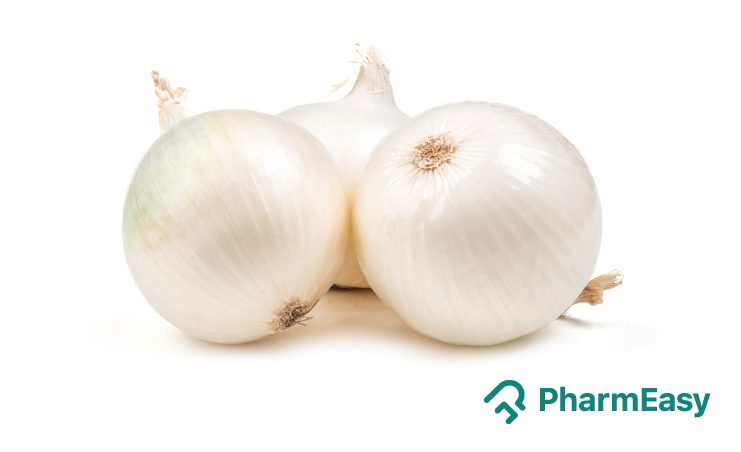White Onion: Uses, Benefits, Side Effects By Dr. Smita Barode
By Dr Smita Barode +2 more

Get,

to manage your symptom
Get your,


4 Cr+ families
benefitted

OTP sent to 9988776655



You’ve successfully subscribed to receive
doctor-approved tips on
Whatsapp

Get ready to feel your best.

Hi There,
Download the PharmEasy App now!!


Register to Avail the Offer
Send OTPBy continuing, you agree with our Privacy Policy and Terms and Conditions

Hi There,
Sign up on PharmEasy now!!
Trusted by 4 crore+ families

OTP sent to 9988776655



You have unlocked 25% off on medicines




Code: NU25
By Dr Smita Barode +2 more
Table of Contents
Do you have a habit of munching raw onions in a restaurant while waiting for food to arrive? or fill your pani puri with more pyaaz (onion)? Well, raw onions may or may not be your preference, but in the cooked form they surely can make mouths water. In India, onions are regularly used in our meals and difficult for us to imagine our meals without them. The scientific name of the White onion is Allium cepa L. and belongs to the family Amaryllidaceae. This white onion is one of the most grown and oldest crops in the world which originated in West Asia, Turkistan, and Afghanistan. China is the largest producer of onions and India is the second largest.

Onions have low perishability, i.e., it does not get spoilt so easily1. Different variety of onions like yellow, purple, white, and red are available which are slightly different from each other. In white onions, quercetin (a bioactive compound) is less than in red onions and they contain other compounds called ceposides A, B and C in them2. Let us discuss the health benefits of White onion.
White onion contains 36 kcal of energy in 100gm. The following are the nutrients present in 100g of white onion:
From my knowledge, several compounds in white onions may aid in the fight against cancer. One of the most abundant food sources of a substance known as quercetin, which is believed to stop the activity or production of substances thought to cause cancer. A decreased chance of getting lung cancer has been linked to a diet high in quercetin9.
Dr. Siddharth Gupta, B.A.M.S, M.D (Ayu)
White onion might possess the following properties:
Organic sulphur compounds are found in white onions. These substances are to blame for their acrid, overpowering taste and odour. Your risk of heart disease and stroke may be decreased because organic sulphur compounds may assist in lowering the level of cholesterol in your body and may also help dissolve blood clots. I suggest acquiring the most sulphur compounds from onions and consuming them raw as opposed to cooked9.
Dr. Rajeev Singh, BAMS
There are various active components in white onion that might be helpful against certain diseases. Some of the potential uses of white onion are as follows:

The activity of the alpha-glucosidase and alpha-amylase play a role in the progression of diabetes. It was seen in studies that white onion might have the capacity to reduce the activity of these compounds and may help in lowering blood glucose levels. This might be due to the presence of the various phytochemicals present in it. Therefore, white onion might be helpful for diabetes. However, ensure that you consult a doctor for the proper diagnosis and treatment of diabetes and refrain from self-medication6.

It was seen in studies that white onion might interfere with the activity of an enzyme Angiotensin-converting enzyme (ACE) which alters the blood pressure. Many drugs which are prescribed by doctors for high blood pressure also target this enzyme to lower the blood pressure. Therefore, white onions might also reduce blood pressure. However, kindly consult a doctor and do not self medicate for your health conditions. Do not self medicate6.

Studies have shown that white onions contain many phytochemicals like quercetin and kaempferol which exhibit antioxidant properties. This antioxidant property of white onions might help in reducing oxidative stress by neutralizing free radicals. Thereby, white onion may help against cell damage and chronic diseases caused by oxidative stress7.

White onions contain ceposides in them and these ceposides are saponins that might be responsible for the antifungal activity. In a study4, the ceposides isolated from white onions were evaluated for their antifungal activity against different fungi. Therefore, white onions might be effective against certain fungi and fungal infections. However, more studies are required to prove these possible effects. If you have any fungal infections consult the doctor and do not self-medicate.

Onions might exhibit many beneficial properties as a nutraceutical vegetable and may help in reducing the risk of heart diseases. It may act as an antioxidant, regulate blood lipids, and improve the function of blood vessel cells. Therefore, by decreasing the risk of heart disease, onions might help in the maintenance of heart health. Heart diseases are serious, and you must consult a doctor for proper diagnosis and treatment of suspected heart diseases5. Do not self-medicate.

A study5 was conducted to check the effect of onion on weight. They were given onion peel extracts containing quercetin. It was noted that over a period there may be a decline in the body fat mass and the body-mass index (ratio of fat to muscle calculated according to individual height and weight). Therefore, quercetin present in white onions might be helpful for weight management. However, more large scale studies are required. If you want to manage weight consult a proper nutritionist and do not self medicate.
Though there are studies that show the potential uses of white onion in various conditions, these are insufficient and there is a need for further studies to establish the true extent of the benefits of white onion on human health.
The bulbs of white onion can be used for cooking. It is used in the preparation of different kinds of dishes in various cuisines around the world. It has a pungent flavour and can be used in the following ways:
You must consult a qualified doctor before taking onion in large quantities or any herbal supplements. Do not discontinue or replace an ongoing treatment of modern medicine with an ayurvedic/herbal preparation without consulting a qualified doctor.
Your body odour may be the only drawback to eating white onions that you will likely notice. The sulphur compounds in onions that are broken down by your body may react with perspiration on your skin to produce what is typically thought of as an unpleasant body odour. White onions may worsen gas and bloating in people with irritable bowel syndrome. If so, I suggest limiting their usage is advised9.
Dr. Smita Barode, B.A.M.S, M.S.
Consumption of white onion might cause heartburn5. There is a requirement for more studies to be performed for the exploration of more side effects of white onion if any. Therefore, ensure that you consult a doctor if you notice any unusual effects after the consumption of white onion.
Also Read: Cabbage (Patta Gobi): Uses, Benefits, Side effects By Dr. Rajeev Singh
White onion is relatively safer when taken in food quantities. There have been no reports regarding the safety of white onion in children and elderly individuals.
There have been no reports of the effects of white onion on pregnant women. Therefore, it is advised to consult and discuss with a doctor before use.
Also Read: Onion (Pyaaz): Uses, Benefits, Side Effects and More!
Studies have shown that eating cooked onions might have the potential to increase warfarin (a drug which is helpful against blood clots) activity8. Therefore, kindly consult a doctor and confirm whether it is safe for you to consume onions, especially if you are undergoing any treatment and are on medication for the same. There is a need for more research to establish the effects of onion on other drugs.
Also Read: Gulvel: Uses, Benefits, Side Effects, Precautions & More!
White onions might be against diabetes, blood pressure, oxidative stress and for fungal infections. However, more research is required to prove the possible benefits of white onion. Therefore, kindly consult a doctor for the stated conditions and do not self-medicate1,4,6,7.
Yes, you can use dried white onion for cooking. You can use it in soups, salads, and dishes1.
There are no reports regarding the potential uses of white onion for hair. Therefore, there is a requirement for more research on this subject.
Sometimes, cooked white onion might cause heartburn. Kindly consult a doctor and discuss whether it is safe for you to consume onions5.
Yes, white onions might help in lowering blood pressure by possibly interfering with the activity of ACE (angiotensin-converting enzyme) which is responsible for the abnormal rise of blood pressure. However, ensure that you consult a doctor for elevated blood pressure and do not self-medicate6.
Disclaimer: The information provided here is for educational/awareness purposes only and is not intended to be a substitute for medical treatment by a healthcare professional and should not be relied upon to diagnose or treat any medical condition. The reader should consult a registered medical practitioner to determine the appropriateness of the information and before consuming any medication. PharmEasy does not provide any guarantee or warranty (express or implied) regarding the accuracy, adequacy, completeness, legality, reliability or usefulness of the information; and disclaims any liability arising thereof.
Links and product recommendations in the information provided here are advertisements of third-party products available on the website. PharmEasy does not make any representation on the accuracy or suitability of such products/services. Advertisements do not influence the editorial decisions or content. The information in this blog is subject to change without notice. The authors and administrators reserve the right to modify, add, or remove content without notification. It is your responsibility to review this disclaimer regularly for any changes.
Comments

Leave your comment...
You may also like
Comments